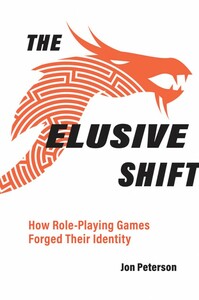You need to sign in or sign up before continuing.
Take a photo of a barcode or cover
challenging
informative
medium-paced
I just finished reading this, and I must say, I found it very interesting throughout. I'm very glad to have read it. This book was brought to my attention, I think, when it was mentioned on one of Matt Colville's YouTube videos (that, or a similar video by someone else, I can't quite remember). This is quite a scholarly work, and looks at the history of table-top role-playing games by researching what those involved in designing, producing, and playing those games were saying in fanzines published at the time. The focus of this work is the 70s and 80s, when these games first appeared and began to differentiate themselves from the wargames that had come before. In fact, it chronicles the creation and adoption of even the very terms we use to discuss these games, such as the term role-playing being used to describe them. What I found most fascinating about this quite well-written tome is that many of the heated debates about role-playing games and how they should be played that one can easily become embroiled in when looking in online and social media spaces these days all seem to have played out before in the pages of the fanzines. Since the literal inception of these games, it seems all that is now has indeed come before. And, this is not to be pessimistic about the games. Rather, I left with a greater understanding that the search for why we play these games has been going on since we have played these games, and those whys are rich and varied, and those espousing certain whys as the one true way were as vehement then as they are today. The book is rich with footnotes that add to the well-researched passages. It avoids canonizing the creators of many of the important initial games, and sidesteps its focus on those individuals by evaluating the discourse of the participating gamers as a whole. In this way, while it treads on some history I was familiar with, it uncovered to me many conversations and ideas with which I was unfamiliar. I found it very rewarding. If you are interested in the subject matter, this is well worth the time.
In 1974 Dungeons & Dragons described itself as a set of “rules for fantastic medieval wargames campaigns.” Nowhere in the text could the term “role-play” or “role-playing game” be found. This book attempts to show how that term came to be applied to D&D and the games it inspired, and how the application of that term shaped the discussion of what exactly D&D (and other role-playing games) was, and how it should be played.
The author does this largely through exploring the fanzines of the era, within which a lot of this debate played out. In the process, showing that many of the questions asked by later gamers as to what was the nature of role-playing were being asked by the earliest players, and many of the same answers were being presented.
An excellent addition to the still rather limited corpus of works covering the history of role-playing games.
The author does this largely through exploring the fanzines of the era, within which a lot of this debate played out. In the process, showing that many of the questions asked by later gamers as to what was the nature of role-playing were being asked by the earliest players, and many of the same answers were being presented.
An excellent addition to the still rather limited corpus of works covering the history of role-playing games.
informative
reflective
slow-paced
informative
slow-paced
informative
reflective
medium-paced
Bit of a dry book, but a great read for those interested in the history of RPGs. I think my two main takeaways were:
Gygax did not invent RPGs at all. In fact he even pushed back against both the term and the playstyle. He only embraced it later when he realized it was profitable. But even more importantly there are at least five other games before D&D which could easily be called a roleplaying game, and at least one of those games had direct influence on D&D too. I will eternally be greatful to this book for giving me more support against anyone who thinks Gygax was anything but trash.
I was simultanously frustrated and amused by reading about the kind of disagreements geeks had back in the 70s. But at the end of the book there's some great thoughts on how all that bs ultimately inspired people to create better and more interesting games and I really feel that.
Gygax did not invent RPGs at all. In fact he even pushed back against both the term and the playstyle. He only embraced it later when he realized it was profitable. But even more importantly there are at least five other games before D&D which could easily be called a roleplaying game, and at least one of those games had direct influence on D&D too. I will eternally be greatful to this book for giving me more support against anyone who thinks Gygax was anything but trash.
I was simultanously frustrated and amused by reading about the kind of disagreements geeks had back in the 70s. But at the end of the book there's some great thoughts on how all that bs ultimately inspired people to create better and more interesting games and I really feel that.
Dry, and a little hard to follow all the named people as, because it’s not narrative, they don’t have any distinguishing characteristics, but very interesting. It asks some questions that I didn’t think were this big, despite being in the hobby for almost thirty years. Would recommend if you’re interested in gaming history or design.
informative
informative
reflective
medium-paced






